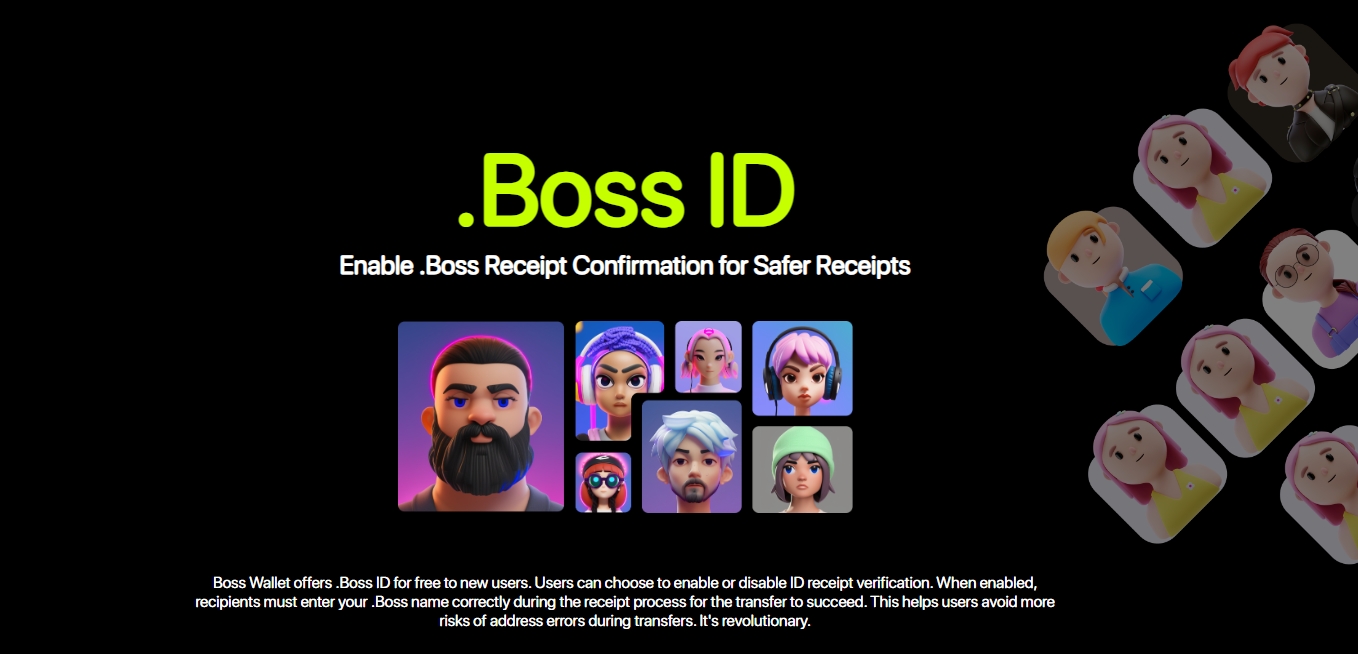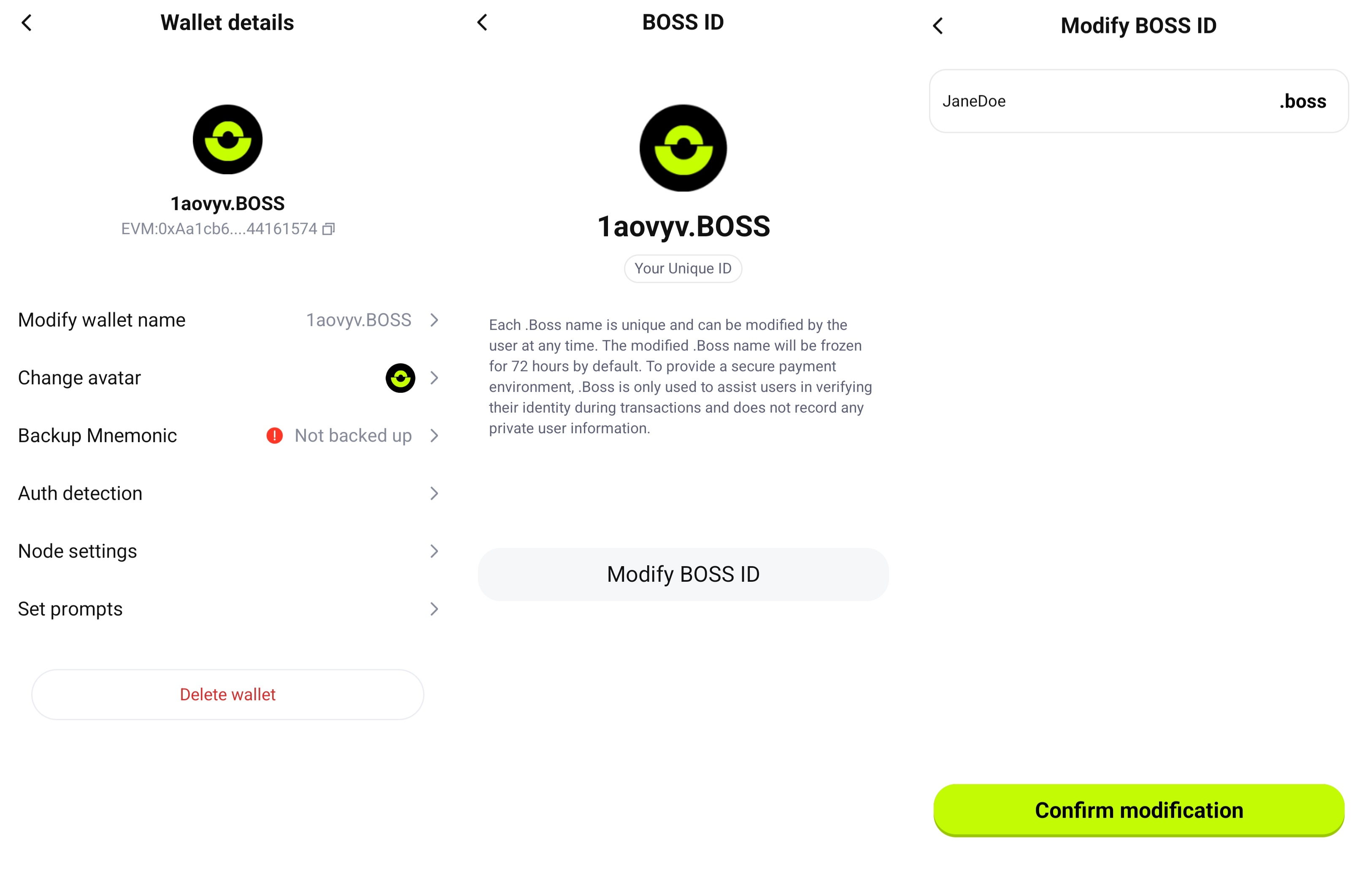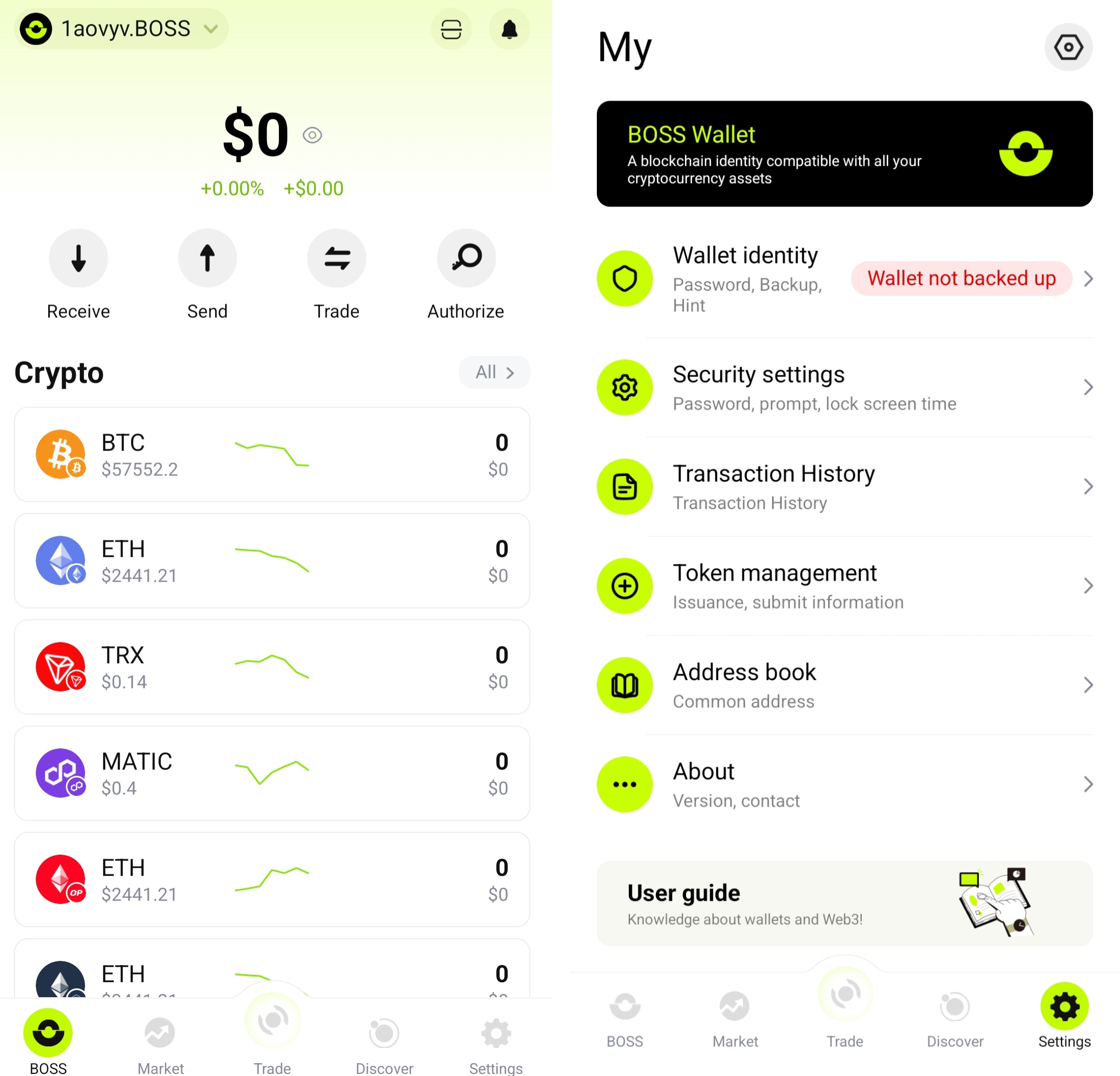What Is BOSS Wallet’s BOSS ID and How Does It Improve Wallet Security?
Summary: BOSS Wallet’s BOSS ID improves wallet security while making it easier for users to send and receive cryptocurrencies by linking their crypto wallet address to a human-readable domain.
Key Takeaways
● Decentralized IDs allow users to identify themselves online through a human readable address instead of using the string of letters and numbers that make up a blockchain address.
● BOSS ID lets users verify the identity of recipients when sending assets to another BOSS Wallet account. Users can set their BOSS ID after creating a BOSS Wallet account.
● Using BOSS ID allows users improved security and ease of asset transfer as they can easily confirm the identity of the recipient through their BOSS ID, protecting them from scams like zero-value token transfer attack.

What Are Decentralized IDs (DIDs)?
Decentralized IDs are also known as Decentralized Identifiers (DIDs) for users to identify themselves online without relying on a centralized institution. In the case of web3, they offer users an alternative to the string of numbers and letters that make up a blockchain address. Instead of using an Ethereum address like 0xa08A2616A76C8be14e75c7363fCEc99Cd48A28e8, users can link their blockchain address to a human readable domain, such as JaneDoe.eth.
Generally, the format for a decentralized ID is a chosen name, followed by a domain suffix (e.g. .eth). The suffix indicates each system’s compatibility and use cases, like how .eth indicates that such addresses are tailored for Ethereum, or .btc represents an address on the Bitcoin blockchain. BOSS Wallet has also introduced its own DID with the suffix .BOSS, which is developed for use with the BOSS Wallet.
Now, let’s take a look at BOSS ID and how it works.
What Is BOSS ID?
Boss ID was designed to offer users a user-friendly alternative to the string of characters seen in conventional wallets, where the user’s public key address = identity. With BOSS ID, users can verify the identity of recipients when transacting using BOSS Wallet.
BOSS IDs need to be unique, although they can be modified at any time by the user. That said, to minimize confusion caused by users repeatedly changing their BOSS ID, BOSS IDs are frozen for 72 hours after changes.
When you set up your BOSS Wallet, you’ll be assigned a random BOSS ID. However, you can change it to show a unique identifier. Let’s look at how you can modify your BOSS ID:
Sign into your BOSS Wallet.
Go to your Settings page, then tap Wallet Identity.
Under Wallet details, tap on Modify wallet name.
On the next page, tap on the button to Modify BOSS ID.
Enter your new preferred BOSS ID and Confirm modification.

With this, you’ve successfully changed your BOSS ID!
Benefits of BOSS ID
The most obvious benefit of BOSS ID is how it turns the string of numbers of a crypto address into human readable characters, while allowing for some personalization of your web3 identity.
Beyond that, let’s take a look at other key benefits of using a BOSS ID:
Improved Security
Before we look at how BOSS ID improves security, we need to understand how scammers operate:
One common scam in crypto is the zero-value token transfer attack, targeting users that transfer tokens to addresses they have previously interacted with without carefully checking the full string of characters that make up a cryptocurrency address. When humans see a cryptocurrency address, they often focus on the first and last characters, paying less attention to the middle characters. Even when represented on crypto wallets, the middle characters are usually represented as an ellipsis (...).
In this attack, scammers generate vanity addresses that intentionally match the first and last few characters of an address the target interacted with recently. For example, if the potential victim recently sent tokens to the address 0xa08A2616A76C8be14e75c7363fCEc99Cd48A28e8, the attacker will create an address that starts with 0xa08A and ends with A28e8, with the middle characters randomized.
When the target completes a transaction, the attacker will use the generated address to transfer a small amount of assets to the target’s address. Due to the similarity between the two addresses, if the user regards the scammer’s address as familiar and unintentionally copies the scammer’s address and makes a transfer, the assets will be sent to the scammer, which is an irreversible process due to the immutable nature of the blockchain.
With BOSS ID, users can transfer assets between BOSS Wallets by entering the recipient’s BOSS ID instead of relying on copying and pasting the full string of characters of a crypto address. After all, it’s undeniably easier to enter JaneDoe.BOSS than it is to enter and triple check that 0xa08A2616A76C8be14e75c7363fCEc99Cd48A28e8 is correct.
Ease of Asset Transfer
This brings us to the next benefit of BOSS ID. It’s easy for users to transfer assets by entering the recipient’s BOSS ID and confirming that it is tied to the correct user. Instead of repeatedly checking the string of characters to ensure that it is correct, users just need to enter the receiving BOSS ID. As an extra security measure, users need to enter their password to confirm that the recipient is correct, after which the transaction will be officially broadcast to the chain.
BOSS ID vs. Decentralized Identity Services
Now, let’s look at how BOSS ID compares against decentralized identity infrastructure providers like ENS and BNS.
Chains Supported
Decentralized identity services like Ethereum Name Service (ENS) work through a system of smart contracts that automatically resolve the ENS name to the attached web address. However, as the name suggests, ENS works on Ethereum, and likewise for Bitcoin Name Service (BNS), which only works on the Bitcoin network or Solana Name Service (SNS) that only works for the Solana blockchain. This suggests that if you use multiple blockchains, you’ll need to manage multiple decentralized identity infrastructure providers.
Meanwhile, on BOSS Wallet, regardless of whether you are receiving BTC, ETH, or SOL, you can use the same BOSS ID to receive all supported assets. However, do note that BOSS ID only works for transactions between BOSS Wallets. This means if you are sending assets to your BOSS Wallet from an external wallet, you will still need to enter your BOSS Wallet crypto address.
Cost
Registering a BOSS ID is free. However, registering a .eth domain on ENS will cost anywhere from $5 to $640 per year, depending on the length of your preferred username, and is dependent on availability. Meanwhile, a .sol domain on SNS will cost between $20 to $750, while a .btc domain on BNS costs 2 STX with renewal every 5 years regardless of length.
That said, decentralized domains on ENS, BNS, and SNS function like NFTs and can be resold on marketplaces. This is particularly in the case for sought after domains, with paradigm.eth ranking as the most expensive crypto domain ever sold. It sold for $1.51 million (420 ETH) on October 9 2021.
However, there are free naming services available, like Coinbase’s .cb.id username, which are cb.id subdomains under ENS that are distributed to users for free. However, like BOSS Wallet, users can only hold one username per wallet, and if they change their username to a new one, their old username may be open for registration for anyone on a first-come, first-served basis after a period of time.
Other Features of BOSS Wallet
Besides BOSS ID, BOSS Wallet also has additional features to make for an easy and seamless user experience. Let’s take a look at some of these below:
Gas Pool
BOSS Wallet has a Gas Pool feature that lets users pay gas fees across multiple chains without requiring the chains’ native tokens for gas fees. BOSS Wallet does this through gas abstraction, where smart contracts remove the complexities around acquiring gas tokens, allowing users to use tokens they already hold to pay for transaction fees.
This makes it easy for new crypto users to move to on-chain transactions, as they no longer need to acquire native tokens through centralized exchanges or through donations. With BOSS Wallet’s multi-chain Gas Pool, users can now deposit supported cryptocurrencies like USDT into the Gas Pool to pay for cross-chain transactions.
When users want to initiate transactions on any one of BOSS Wallet’s supported 90 chains, the Gas Pool reviews the estimated gas fee to be paid, and ensures that there are sufficient assets deposited in the user’s Gas Pool to pay for the transaction fee, while choosing the simplest signature method to ensure the lowest gas fees incurred.
For new BOSS Wallet users, they’ll also receive around 20 USDT in Gas Pool quota, so they can essentially transfer assets on BOSS Wallet with 0 gas fees!
MultiChain
As briefly mentioned above, BOSS Wallet is a multichain wallet, making it easy for users to store and transact assets across multiple blockchains. As mentioned above, there are wallets (and most decentralized naming services) that are chain or virtual machine specific. In this case, you’ll need multiple wallets to manage your assets across multiple chains — that’s a lot of wallet addresses to monitor and manage.
If you’re also looking to tie these to unique names on each wallet, you’ll also need to spend additional crypto on these, especially if the names are not available on the public domain and you’ll need to purchase them off a secondary marketplace.
Easy Account Management
BOSS Wallet enables users to use just one secret recovery phrase to manage all assets on the platform, regardless of chain. This is done through the BIP44 standard, where the secret recovery phrase — which is generated when users first create their BOSS Wallet account — can be used to generate multiple wallet addresses for all supported chains based on their individual standards.
With only one secret recovery phrase to manage, it makes it easier for users to manage their crypto holdings across multiple chains, as in the event they forget their password, they can reclaim access to all their wallets across every supported chain with the same recovery phrase.
At the same time, users can still enjoy the security of having separate wallets with separate private keys, which better allows them to manage risk. For example, a user may opt to have one wallet created solely for airdrop farming with little assets within, which can be risky due to the number of airdrop scams and phishing sites. They can also create another to farm yield on DeFi protocols, and yet another for staking and holding assets long term.
Another benefit of BOSS Wallet is that users also don’t need to learn about signing transactions; instead, to approve transactions, they just have to enter their password for confirmation.
Buying and Swapping Crypto Assets on BOSS Wallet
Users can buy crypto assets on BOSS Wallets through supported fiat payment methods and payment providers like Simplex and BANXA. In this case, users just need to select the crypto asset and their chosen fiat currency of choice, before proceeding to payment and confirming the transaction. Once payment is confirmed, they’ll receive the cryptocurrency in their BOSS Wallet.
Users can also swap assets on BOSS Wallet, which has a powerful aggregator to help them discover the best price for any swap across over 20 networks, 400 DEXs, and 20 cross-chain bridges. BOSS Wallet charges a fee of 0.3% to 0.5% per swap to support ongoing platform development.
To make cross-chain transactions even easier, users can opt to use the abovementioned Gas Pool feature to pay for cross-chain swaps.
Conclusion
BOSS ID provides users with an easy way to transfer assets to BOSS Wallet accounts. While at time of writing, BOSS ID only works within BOSS Wallet, the team may cooperate with other wallets around decentralized IDs in the future. BOSS Wallet’s goal is to parse and point to various DID technologies to confirm identities during the transfer process, where users can eventually transfer assets to different decentralized IDs using their human-readable addresses.
Always protect your secret recovery phrase and private key, and never share these with anyone. Note that this article is for informational purposes, and is not intended to serve as financial advice. Always do your own research and double check before transferring crypto to any address.









 本文精华如下:
本文精华如下:


.png)
























